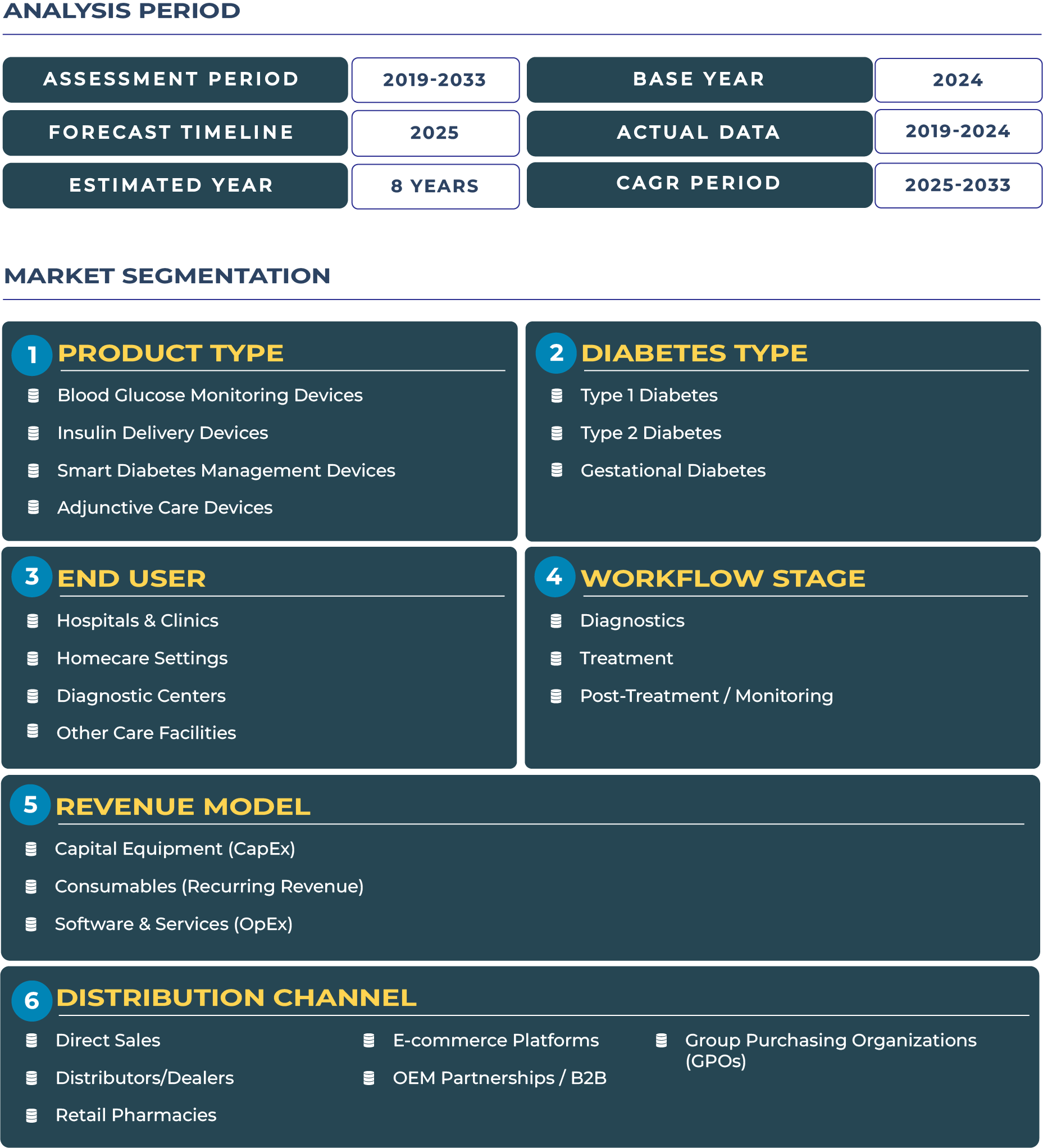Diabetes Care Devices Market Outlook: Israel as a Global Innovation Hub Driving the Diabetes Care Devices Market
Israel has long positioned itself as a hub for innovation, combining advanced research, a strong healthcare ecosystem, and entrepreneurial agility to develop transformative healthcare solutions. In the diabetes care devices industry, Israel has emerged as an R&D-to-commercialization hub, where local startups, academic institutions, and medtech companies collaborate to pilot and scale new technologies. This innovation-driven approach allows for rapid prototyping and export of solutions designed for global adoption. The diabetes care devices market in Israel stood at USD 62.8 million in 2025 and is projected to reach USD 77.6 million by 2033, growing at a modest CAGR of 2.7% between 2025 and 2033. Despite geopolitical uncertainties and economic challenges, the sector continues to strengthen due to strong clinical co-development, export-ready innovations, and engagement with key opinion leaders. This makes Israel a vital node in the global diabetes care devices landscape, where local advancements frequently extend beyond national borders.
Why Israel diabetes care devices Industry Represents a Crucial R&D-to-Commercialization Ecosystem
The Israel diabetes care devices market outlook is characterized by its dual strengths—domestic innovation and global commercialization. Israel’s medtech ecosystem has consistently focused on clinical collaborations, with hospitals and research centers serving as incubators for testing advanced solutions such as continuous glucose monitoring (CGM) devices and smart insulin delivery technologies. Given the country’s relatively small patient base, many innovations are designed with export potential in mind, ensuring scalability across larger international markets. The political and economic uncertainties in the region have encouraged companies to adopt resilient business strategies, prioritizing technologies that integrate digital monitoring and connected care. Moreover, partnerships between Israeli innovators and global players provide significant momentum, strengthening the local ecosystem while simultaneously expanding international reach. This environment creates a sustainable model where domestic challenges fuel inventive solutions that resonate across the global diabetes care devices sector.
Growth Catalysts Fueling the Expansion of the Diabetes Care Devices Ecosystem in Israel
The growth of the diabetes care devices industry in Israel is underpinned by strong R&D infrastructure and clinician adoption. Israel’s hospitals are deeply engaged in pilot programs, enabling real-time feedback loops between device developers and healthcare professionals. This clinical engagement accelerates the commercialization of advanced solutions, such as smart insulin pumps and connected glucose monitoring systems, that can be scaled globally. Additionally, government-supported digital health initiatives, led by organizations like the Israel Ministry of Health, enhance the adoption of next-generation devices. International companies frequently collaborate with local startups to co-develop products tailored for global export, with Israel acting as a proving ground for medical device validation. These dynamics foster a resilient diabetes care devices landscape that thrives on integration between R&D, clinical practice, and international commercialization.
Challenges of Scale and Market Constraints Hindering Widespread Growth
Despite its innovation-driven strengths, the Israel diabetes care devices market faces challenges related to scale and manufacturing limitations. As a relatively small domestic market, Israel lacks the mass production infrastructure to compete with larger manufacturing hubs. This restricts its ability to bring down device pricing for widespread adoption, particularly for cost-sensitive products such as insulin pumps and adjunctive care devices. Furthermore, regulatory complexities and procurement constraints in the public healthcare sector often delay widespread rollout of new solutions. Political and geopolitical tensions also create uncertainty in supply chains and limit long-term planning for some companies. While these constraints do not diminish Israel’s role as an R&D hub, they highlight the need for partnerships with international players to bridge manufacturing gaps and ensure affordability for local patients. This dynamic underscores why Israel diabetes care devices industry is geared more toward innovation and export rather than high-volume domestic manufacturing.
Trends and Opportunities Shaping the Future of Israel diabetes care devices Sector
One of the defining trends in Israel diabetes care devices market is its evolution into a clinical trial and innovation hub. Leading hospitals in Tel Aviv, Haifa, and Jerusalem frequently partner with device developers to conduct pilot programs, validating technologies in real-world healthcare environments. This has positioned Israel as a regional leader for testing next-generation continuous glucose monitoring systems and smart diabetes management platforms. On the opportunity side, Israel has immense potential to spin out regional solutions that integrate AI-based monitoring and connected health devices into global healthcare systems. By leveraging its strong digital health infrastructure and vibrant startup ecosystem, Israel can lead in developing interoperable platforms that align with international telehealth adoption. The combination of advanced R&D, government support, and entrepreneurial spirit creates a fertile ground for new growth avenues in the diabetes care devices ecosystem.
Competitive Landscape: Global Collaborations and Local Strengths Define Israel diabetes care devices Market
The competitive landscape of Israel diabetes care devices sector is shaped by the convergence of international giants and local medtech innovators. For instance, in 2023, Insulet expanded its Omnipod product line in Israel through partnerships with local healthcare providers, reinforcing the country’s role as a hub for co-developing and testing tubeless insulin pump technologies. Local startups, such as DreaMed Diabetes, continue to gain traction by developing smart diabetes management platforms that integrate with connected care ecosystems. Israel’s medtech companies are increasingly leveraging the nation’s expertise in digital health, cybersecurity, and IoT to create diabetes care devices with global relevance. The competitive strategy focuses on positioning Israel as an R&D-to-market hub, where global players collaborate with Israeli innovators to refine, validate, and commercialize devices that are later introduced to international markets. This approach ensures Israel maintains a unique competitive advantage in the diabetes care devices industry.







